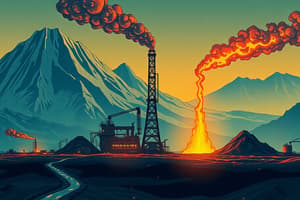Podcast
Questions and Answers
What are the three forms of fossil fuels?
What are the three forms of fossil fuels?
- oil, natural gas, coal (correct)
- gasoline, oil, coal
- wood, charcoal, gasoline
- charcoal, oil, natural gas
What environment existed for the formation of coal?
What environment existed for the formation of coal?
- swamp (correct)
- aquatic
- desert
- arctic
Why are fossil fuels considered 'nonrenewable'?
Why are fossil fuels considered 'nonrenewable'?
- they are hard to use
- they take millions of years to form (correct)
- they cannot form in today's climate
- they are not considered nonrenewable
Which process is crucial for fossil fuels to form?
Which process is crucial for fossil fuels to form?
What does compaction refer to in the context of sedimentary rock formation?
What does compaction refer to in the context of sedimentary rock formation?
Which term refers to the action of breaking down rocks and minerals into smaller particles?
Which term refers to the action of breaking down rocks and minerals into smaller particles?
What do we call the natural resource that can be replenished over time?
What do we call the natural resource that can be replenished over time?
Which of the following is formed from ancient marine organisms and is used as energy and in plastics manufacturing?
Which of the following is formed from ancient marine organisms and is used as energy and in plastics manufacturing?
What do we call the remains or traces of organisms that have died in the past?
What do we call the remains or traces of organisms that have died in the past?
Which process involves the movement of sediments from one location to another?
Which process involves the movement of sediments from one location to another?
What is the primary component derived from the compaction of peat in swamp environments?
What is the primary component derived from the compaction of peat in swamp environments?
Which gas is considered a fossil fuel that is found in a gaseous state?
Which gas is considered a fossil fuel that is found in a gaseous state?
Which of the following refers to the decay or breakdown of organic material?
Which of the following refers to the decay or breakdown of organic material?
What is the process called when sediments are dropped off in a new location?
What is the process called when sediments are dropped off in a new location?
How is petroleum formed?
How is petroleum formed?
What occurs when sediments are squeezed and compressed together?
What occurs when sediments are squeezed and compressed together?
Which type of rock is formed from layers of compressed sediment?
Which type of rock is formed from layers of compressed sediment?
What term describes the breaking down of rocks into smaller pieces called sediment?
What term describes the breaking down of rocks into smaller pieces called sediment?
Which process involves the movement of soil and rock by water, wind, or other forces?
Which process involves the movement of soil and rock by water, wind, or other forces?
What is a primary characteristic of sedimentary rocks?
What is a primary characteristic of sedimentary rocks?
Which of the following processes is directly responsible for forming layers on the ocean floor?
Which of the following processes is directly responsible for forming layers on the ocean floor?
Flashcards
Weathering
Weathering
The process of breaking down rocks, soil, and minerals through contact with the Earth's atmosphere, water, and biological organisms.
Erosion
Erosion
The process of moving weathered material from one place to another.
Deposition
Deposition
The process of sediments settling and accumulating in a new location.
Compaction
Compaction
Signup and view all the flashcards
Cementation
Cementation
Signup and view all the flashcards
Sedimentary Rock
Sedimentary Rock
Signup and view all the flashcards
Petroleum
Petroleum
Signup and view all the flashcards
Fossil
Fossil
Signup and view all the flashcards
Coal
Coal
Signup and view all the flashcards
Petroleum (oil)
Petroleum (oil)
Signup and view all the flashcards
Non-renewable resource
Non-renewable resource
Signup and view all the flashcards
Renewable resource
Renewable resource
Signup and view all the flashcards
Study Notes
Sedimentary Rocks and Fossil Fuels
- Fossil Fuels: Oil, natural gas, and coal, formed from the remains of ancient plants and animals.
- Organic Material: Dead plants and animals, a key component in fossil fuel formation.
- Coal Formation: Requires a swampy environment.
- Petroleum Formation: Heat and pressure on microscopic plants and animals from millions of years ago.
- Sediment Compaction: New rock formation through compressed sediment.
- Weathering: The breaking down of rocks into smaller pieces.
- Erosion: The process of carrying away weathered materials.
- Deposition: Settling of materials in a new location.
- Compaction: Squeezing and pressing sediment together.
- Cementation: Gluing sediment together with minerals.
- Non-Renewable Resources: Resources that take a very long time to form; petroleum, coal, and natural gas.
- Renewable Resources: Resources that can be replaced relatively quickly.
- Decomposition: The process of rotting or decay.
- Sediment: Small pieces of rock broken down by weathering.
- Fossil: The remains or traces of living things from the past.
Studying That Suits You
Use AI to generate personalized quizzes and flashcards to suit your learning preferences.




